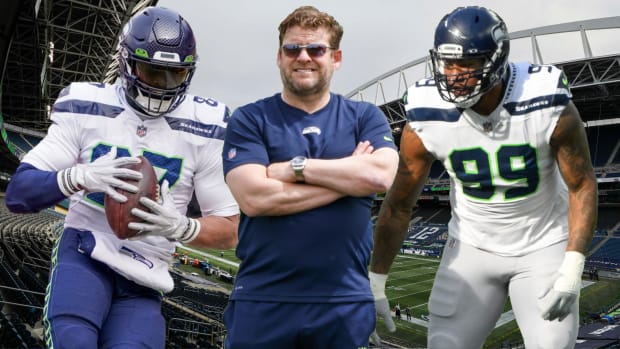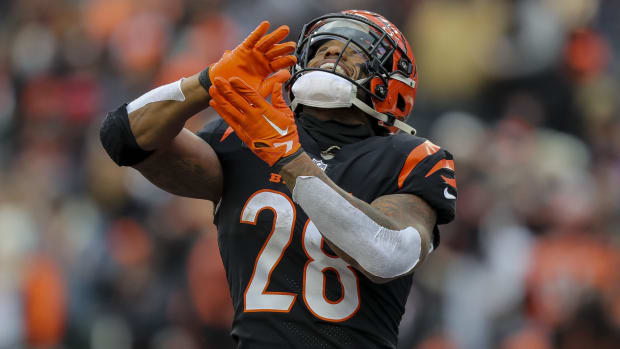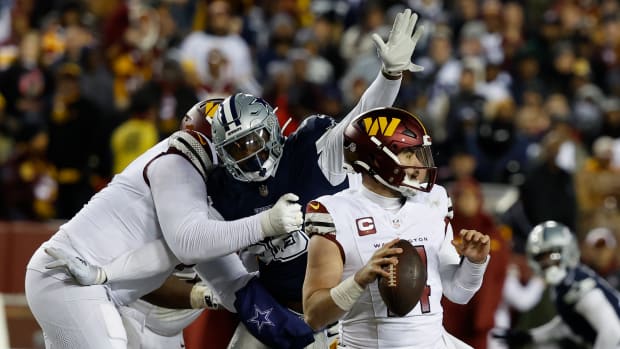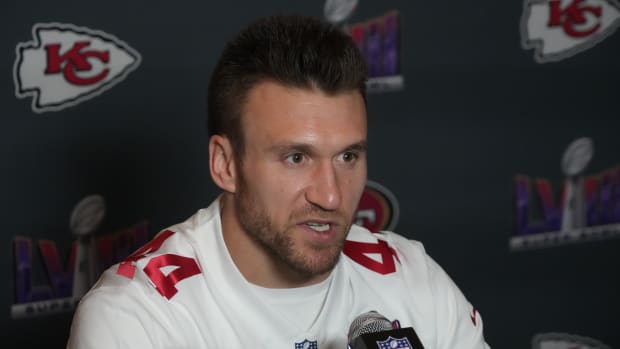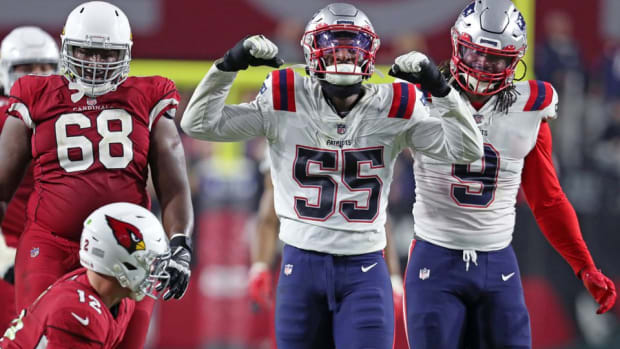Which teams have benefited most from round 1 trades in NFL drafts?
Over the past few weeks, a consensus has formed that Tampa Bay will select Jameis Winston with the top choice in the NFL draft. As for what happens after that, it’s anyone’s guess.
With hundreds of prospects seeking clarity on where they will land, much will depend on what the Tennessee Titans decide to do with the No. 2 pick. They could select one of the other top players in the draft, including QB Marcus Mariota or DT Leonard Williams, or they could trade the pick to a team more desperate to do the former. But any team who’s thinking about trading with Tennessee should take a long, hard look at the fate of franchises who have recently packaged a bundle of draft picks to better their position in the first round.
2015 NFL Mock Draft: Expert picks
Sports research engine PointAfter identified 74 first-round trades over the past 12 years that involved both teams exchanging draft picks as the centerpiece of a deal. This method eliminates a few trades (for example, the Vikings trading Randy Moss for Napoleon Harris, a first-round pick and a seventh-round pick prior to the 2005 draft aren’t accounted for), but it keeps the premise simple: should a team gamble on one prestigious prospect, or several less-heralded rookies?
I tallied the career starts of the 287 draft-picks-turned-players that changed hands in those deals, and the results give an overwhelming advantage towards the teams who elected to trade down. Those 74 trades yielded a net loss of 2,348 starts for the teams who gave up picks to move up in the first round—an average of 31.7 starts lost per trade, or about two seasons worth of a starting-caliber NFL player. From that standpoint, only seven teams have benefited from trading up since the 2003 draft, while the other 19 clubs who chose to do so saw a net loss in players’ starts.
The teams who traded down often mined greater value from their less prestigious first-round pick alone. This supports the notion that the teams who trade up haven’t identified as many players with NFL potential and feel that they must reach to get quality players, while the teams who trade down did a better job of identifying sleepers they could snag while extracting more picks from other, more desperate teams.
• NFL draft rumors: Latest reports and buzz | Top 300 draft prospects
Here are some of the most interesting developments I culled from my research.
Note: The number of starts by each player in this study was pulled from Pro Football Reference.
Winners
Arizona Cardinals
Call the Cardinals minimalists. They’ve made just two trades involving first-round picks over the last dozen years, but their maneuvers down the board last year and especially in 2003 give them the distinction of earning the most net starts (235) in first-round trades than any other club.
The 2003 deal was a franchise-defining move, as Arizona swapped spots with New Orleans in the first round and used the extra picks on linebacker Calvin Pace and a pair of receivers in Bryant Johnson and Anquan Boldin. The trio went on to combine for 384 career starts (and counting).
The Saints, meanwhile, wasted the No. 6 spot on defensive tackle Johnathan Sullivan, who was out of the league by 2006. They did gain a selection used to pick reliable offensive lineman Jon Stinchcomb in the trade, but that didn’t negate the windfall the Cardinals received.
• BURKE: Overrated prospects | FARRAR: Underrated prospects
The Great Arizona Heist of 2003 | PointAfter
New England Patriots
The Patriots have developed an esteemed reputation upon the notion that they swindle general managers hungry enough to mortgage their team’s future for an elite prospect. But the facts don’t fully match up with that stereotype. In fact, New England’s famous preference for trading down and stockpiling picks farther down in the draft hasn’t been nearly as beneficial as NFL fans have been led to believe.
Shane Ray, La'el Collins questions hang over NFL draft festivities
While New England undoubtedly qualifies as a “winner” by netting 197 starts in 12 trades involving first-round picks since 2003, their main reason for success isn’t what you think. Back in 2003, New England famously traded away a first-round pick that became Kyle Boller for a second-round choice and a first-rounder in 2004 that became Vince Wilfork. The deal was undoubtedly a coup for Bill Belichick, as the Patriots benefitted from Wilfork’s 148 career starts over his tenure with the team while Boller never panned out for the Ravens.
Other than that, however, New England’s favorite strategy has rarely been maximized. Since then, the Patriots have traded down in (our out of) the first round a league-high eight times. The picks they received yielded 620 starts, while their trade partners generated 595 starts from theirs. That’s a net gain of just 25 starts from eight trades—a miniscule difference, considering the average trade down nets 30.2 starts.
The picks they’ve given up have been used on guys like Joe Staley, Carl Nicks, Clay Matthews, Dez Bryant and Demaryius Thomas. The best players they’ve acquired from those deals are Jerod Mayo, Devin McCourty and Jamie Collins.
Strangely enough, New England has actually fared much better when they’ve elected to trade up in the first round. They’ve only done so three times since 2003, but those deals resulted in a net gain of 71 starts, as they acquired a trio of very solid defensive building blocks in Ty Warren, Chandler Jones and Dont’a Hightower.
The Pats Decided These Guys Were Worth Trading Up For | PointAfter
Dallas Cowboys
Contrary to popular belief, the Cowboys have fared quite well for themselves when it comes to first-round draft trades. They’ve traded up four times and moved down three times since 2003, gaining a net of 168 starts (tied for third-best in the NFL).
All of their advances up the Big Board look perfectly reasonable in hindsight, as they gained Dez Bryant, Morris Claiborne and Anthony Spencer while their trade partners’ best gains were Devin McCourty, Michael Brockers and Alshon Jeffery.
Even better, they’ve capitalized on teams desperate for a “top-tier” quarterback. In a pair of steals, they acquired picks used to draft Julius Jones, Marcus Spears and Felix Jones while the Browns and Bills used Dallas’ original slots for Brady Quinn and J.P. Losman, respectively.
• VRENTAS: RB Todd Gurley on the fast road to recovery
The Cowboys Ponied Up Picks for These Three | PointAfter
Atlanta Falcons
In complete opposition of the hypothesis laid out in the introduction of this article, the Falcons are unlikely winners when it comes to first-round trades. Atlanta has moved up in the first round five times since 2003, never once trading down. And yet, they’ve managed to net 149 starts in the process. The key has been obtaining other mid-to-late round picks in addition to those first-rounders.
Potential sliders in the 2015 NFL draft
For instance, when the Falcons moved up into the first round via the Colts in 2004 to draft wide receiver Michael Jenkins, they also coaxed a third-round pick from Indianapolis general manager Bill Polian that they used to draft Matt Schaub.
Then, when they flipped Schaub and a first-rounder to Houston in 2007 to move up to No. 8 overall for Jamaal Anderson, they also received two second-round picks, one of which ended up being perennial starting guard Justin Blalock.
Is your head spinning yet? Well, the other second-round pick in that deal was part of a package sent to Washington in 2008 to net three picks used on Sam Baker, Harry Douglas and Kroy Biermann—all valuable pieces of Atlanta’s core that went 13–3 in 2012.
[pagebreak]
Losers
New York Jets
The Jets have desperately hoped for Falcons-like luck since 2003, to no avail. New York has shown a tendency to hone in on specific players, doing whatever it takes to get players they’ve graded as first-round talents. It’s a policy that has produced mixed results, at best. New York has traded up four times in the first round since 2003, never once trading down. They’ve ended up giving away a net of 324 starts in those four swaps, the worst mark in the NFL.
Audibles Podcast: 2015 NFL Mock Draft: Projecting Round 1
The most infamous of those is the Mark Sanchez trade, as the Jets gave away three players (Kenyon Coleman, Brett Ratliff and Abram Elam) and two draft picks (used on Josh Freeman and David Veikune) in 2009 to draft a future pariah.
But the one that really hurts came a year earlier, when the Jets jumped up six spots to draft Dustin Keller. If they had just waited their turn, they likely could have snatched Jordy Nelson, just as the Packers did with New York’s original second-round selection.
Sure, there’s the success story of moving up to pick Darrelle Revis in 2007. But even then, the picks the Jets gave away were used on valuable pieces Jon Beason and Ryan Kalil.
Philadelphia Eagles
Philadelphia is largely in this spot because of an ill-fated 2010 trade that will look even worse as the years go by. Eagles traded up 11 spots to No. 13 overall for Brandon Graham, who has looked like a relative bust so far.
Meanwhile, the picks Philly gave up in that deal were used to draft Dez Bryant, Ed Dickson and Eric Decker. The Broncos didn’t hold onto all of those selections (and in fact combined Bryant’s slot with the pick used on Aaron Hernandez to move up for Demaryius Thomas), but the trade still reflects poorly on the Eagles nonetheless.
• KLEMKO: Who goes No. 1 overall in my last-minute mock draft?
Chip Kelly Sure Could Use These Three Weapons | PointAfter
Washington Redskins
Everyone knows about the Robert Griffin III trade, in which Washington gave away four picks that were eventually used by various teams to draft Morris Claiborne, Greg Robinson, Desmond Trufant and Janoris Jenkins. But Washington also traded up for a quarterback in the first round in 2005, and that was fairly disastrous.
The Wes Welker watch list: Top potential undrafted free agents
In return for the No. 25 pick, which was used on Jason Campbell, Denver fleeced Daniel Snyder’s men for three picks eventually used on linebacker Manny Lawson, wideout Brandon Marshall and cornerback Karl Paymah. You think Griffin’s fortunes might have played out differently by now in D.C. had he enjoyed the luxury of throwing to someone like Marshall?
To add further ignominy to the franchise, Washington is one of just three teams (along with the Colts and Chiefs) to net a negative number of starts from trading down in the first round since 2003. The other 24 teams who did so at least once during that span ended up with more starting-caliber players than they would have had otherwise.
Indianapolis and Kansas City have largely overcome that disadvantage -- with just three winning records since the turn of the century, Washington cannot say the same.
More from Will Laws:
• Re-picking the First Round of the 2005 NFL Draft
• The Least Valuable Player for Each NBA Title Contender
• The 27 Hardest-Throwing Pitchers in MLB
PointAfteris part of theFindTheBestnetwork, a research website that’s collected all the information about Mark Sanchez and the New York Jetsand put it all in one place so you don’t have to go searching for it.
Join FindTheBest to get all the information aboutNFL players,NFL teamsand thousands of other topics.
































